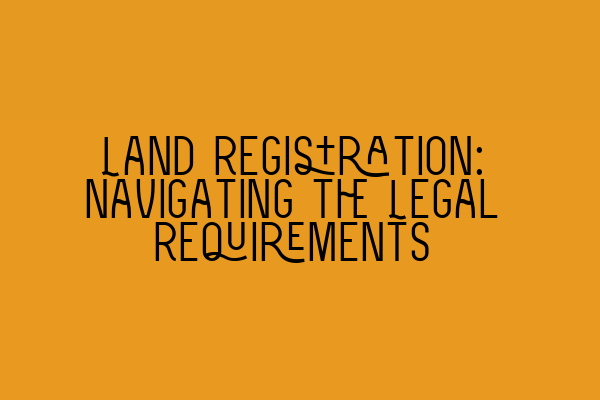**Land Registration: Navigating the Legal Requirements**
Welcome to the official blog of SQE Property Law & Land Law. In this post, we will explore the intricate world of land registration and the legal requirements involved. As a solicitor, it is crucial to have a comprehensive understanding of this topic to ensure the smooth and lawful transfer of property ownership. So let’s dive right in!
**Why is Land Registration Important?**
Land registration is the process of officially recording the ownership and interests in land. It provides clarity and certainty regarding property ownership, protects the rights of landowners, and helps prevent disputes. Additionally, a registered title can be used as security for obtaining mortgages and loans.
**The Land Registration Act 2002 and Its Implications**
The Land Registration Act 2002 brought about significant changes in the land registration system in England and Wales. It introduced a more efficient and modernized framework for land ownership. Under the Act, it is mandatory to register most transactions affecting land, including purchases, mortgages, leases, and easements.
The Act also established the Land Registry, which is responsible for maintaining the Land Register. The Land Register serves as the official record of land and property ownership in England and Wales. It provides detailed information about the property, including the ownership details, any rights or restrictions, and the extent of the registered land.
**Overcoming the Legal Hurdles**
To successfully navigate the land registration process, it is crucial to fulfill the legal requirements imposed by the Land Registration Act 2002. Here are some key elements to consider:
1. **Proper Completion of Forms**: When applying for registration, it is essential to accurately complete the relevant forms, such as Form AP1 for applications to register land and Form FR1 for applications to register a charge. Any errors or omissions can lead to delays or even rejection of the application.
2. **Evidence of Title**: Evidence of title is vital in establishing ownership. This typically includes documents such as contracts of sale, transfer deeds, and leases. It is crucial to carefully review and analyze these documents to ascertain the legitimacy of the ownership claims and to identify any potential issues.
3. **Encumbrances and Restrictions**: The Land Register may contain various encumbrances and restrictions, such as mortgages, easements, and covenants. It is necessary to review these carefully to fully understand the rights and limitations associated with the property. This ensures that any future transactions or use of the land are in compliance with these encumbrances and restrictions.
4. **Boundary Disputes**: Boundary disputes can be complex and may hinder the land registration process. It is important to review any available plans or surveys to accurately determine the boundaries of the property. If there are any disputes, legal advice should be sought to resolve the issue before proceeding with the registration.
5. **Best Practice and Due Diligence**: As solicitors, it is our duty to ensure due diligence has been conducted in researching the property and verifying the title. This includes carrying out thorough searches, investigating any adverse interests or claims, and advising clients on potential risks or liabilities.
**The Role of an Expert Solicitor**
Navigating the legal requirements of land registration can be a challenging undertaking. That is where an expert solicitor comes in. By engaging the services of a knowledgeable and experienced solicitor, clients can ensure that all legal requirements are met, potential issues are identified and resolved, and a smooth transfer of property ownership is achieved.
At SQE Property Law & Land Law, our team of solicitors specializes in property law and land registration. We offer comprehensive services to guide you through the complex process, ensuring compliance with the legal framework and safeguarding your interests.
**Conclusion**
Land registration is a crucial aspect of property ownership and transfer. By adhering to the legal requirements set out in the Land Registration Act 2002 and seeking expert legal guidance, you can navigate this process smoothly and efficiently. At SQE Property Law & Land Law, we are committed to providing exceptional legal services to help you achieve your property goals.
We hope you found this article informative. For more resources and information on the SQE exams and preparation, please check out our related articles:
– [SQE 1 Practice Exam Questions](https://fqps.co.uk/sqe/sqe1-preparation/mcq-practice-quiz)
– [SQE 1 Practice Mocks FLK1 FLK2](https://fqps.co.uk/sqe/sqe1-preparation/practice-mocks-quiz)
– [SQE 2 Preparation Courses](https://fqps.co.uk/sqe/sqe2-preparation)
– [SQE 1 Preparation Courses](https://fqps.co.uk/sqe/sqe1-preparation)
– [SRA SQE Exam Dates](https://fqps.co.uk/sqe/sqe1-sqe2-exam-dates)
Feel free to contact us at SQE Property Law & Land Law for expert legal advice and assistance with your land registration needs.
